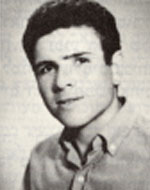Zion, born in Fortuna and Shlomo, was born in the city of Meknes in Morocco in 1944. In 1954, he immigrated to Israel with his parents and eleven brothers and sisters, and lived for a year in Moshav Kalachim in the Negev, And his two older brothers were outside the house – one in the kibbutz and the other in the army – and Zion devoted all his energies to helping his family with the children. Since his childhood, Zion has loved to kick the ball and the soccer game has become the love of his life The youth team of Be’er Sheva, who was then in the second division, thanks to his excellent acting, dedication and energy, was the leader of the team and led him to the elite league, always a model in his behavior and throughout all his years playing football, he was not warned or reprimanded once, When the Six-Day War broke out, Zion was quick to report to the IDF, but was sent to his home with a shabby head, because he was too young to serve. Zion was drafted into the IDF in mid-August 1967, and after successfully completing basic training, he was stationed at the Armored Corps base in the center of the country as a tank driver. Before the end of his service, Mona Zion was appointed a sergeant in his battalion. In his assessment, his commander said: “disciplined, entrepreneurial, accepted by his friends and fulfilled his duties in a very efficient and good manner.” At the end of August 1970, Zion was discharged from regular service and assigned to a reserve unit. During his service in the IDF, Zion met Chana, and after the release of the couple they married and established a family, and the management of Hapoel Netanya came to the aid of the outstanding player and helped him buy an apartment in the city. In November 1971, his eldest son Amos was born, and in October 1973, two weeks before the outbreak of the Yom Kippur War, his two twin daughters, Lilach and Meirav were born. In the sports newspapers of that period, the headlines often appeared, such as: “The noisy head in Tiberias” and “The impressive brake.” One of the articles said: “The outstanding player in the last victory was the dedicated brake and the captain of the team, Zion Roash, whose back position occasionally sprang to the opponent’s goal and scored in his own legs a fine thong in the second half.” On the eve of Yom Kippur, after bringing home his wife and the newly born twins, Zion was called up for reserve service. Was sent to the Sinai front where he fought as a tank driver in the central sector of the Suez Canal. On October 11 he wrote to his wife: “Do not worry, I’m fine.” Three days later, on October 14, 1973, his tank was hit by an enemy missile. The tank crew was wounded and Zion was killed. He was laid to rest in the military cemetery in Be’er Sheva. He left behind a wife and three children, parents, five brothers and six sisters. After his fall, he was promoted to sergeant. In his letter to Hannah, the widow of Zion, the brigade commander wrote: “Your husband fought exemplary battles in which he participated, and thanks to our fallen comrades we have defiled the Egyptian enemy.” In a letter to Defense Minister Moshe Dayan, “Zion was a devoted friendLoyal, and loved by all who knew him. “
